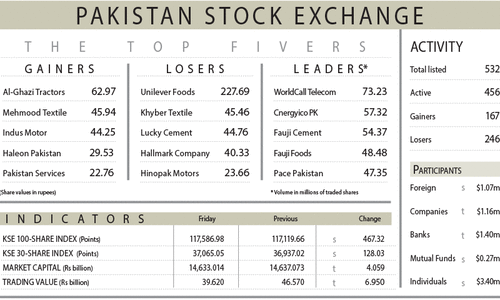KARACHI, Dec 13: Banks have made huge profits through higher banking spread, which reached a record 7.72 per cent in October, 2008.
The State Bank data reflects the continues upward trend of banking spread, while the higher policy interest rate is helping the banks to fetch maximum out of the financial system, which is under threat in the developed economies.
The bankers said the Karachi Inter-bank Offered Rate (Kibor) is till higher than the policy discount rate.
Banks are easily getting 100 to 200 basis points more than the policy discount rate.
Before the formal announcement of the agreement with the International Monetary Fund (IMF), the State Bank raised the interest rate to 15 per cent from 13 per cent and the SBP governor announced to check the much higher Kibor, which was then in the range of 14 to 15 per cent, while the discount rate was 13 per cent.
After witnessing a dip to the level of 6.78 per cent in June 2008, an after effect of minimum profit payment of 5 per cent on saving accounts, the banking sector spread is continuously moving in upward direction.
In October, spread of the banking sector was recorded at 7.72 per cent, which is an-all-time high level. Banks’ lending rate is too high as they are charging Kibor plus banking spread, which cumulatively reaches 24 per cent and above.
The high rate carries negative consequences for the industry and trade and would certainly hit the economic growth.
“A recession is bound to come or we can say we are inviting recession with such a high interest rate,” said Aamir Aziz, a textile exporter.
Analysts and economists have been advising the government not to sign agreement with the IMF, which compelled the country to increase interest rate to 15 per cent and a further increase of (about 1.5 per cent) is expected in January, 2009.
The developed economies, including the United States, European countries and Japan are pumping billions of dollars to avoid recession by accelerating the role of liquidity in the system. Contrary to this Pakistan is limiting flow of liquidity forcing banks to minimise lending.
Analysts said the banking spread is rising despite higher offer to depositors by the banks. The banks are offering up to 20 per cent per annum on deposits.
“These are term deposits, which carry such higher rates ranging from 16 to 20 per cent,” said Mohammad Imran, head of research at First Capital Securities.
He said the yield on such term deposits are much lower than the offered interest rate. The return on deposits is calculated on simple interest, while the credit to borrowers carries compound interest rate.
Imran said the banks are offering up to 18 per cent rate of return on their deposits schemes (10 years) but these are quoted as flat rates.
“Their effective yield is only 10.84 per cent,” he said adding that the effective lending rate of return is equal or more than the quoted rates.
“These marketing tactics are another reason behind the higher spreads,” he said. The term deposits are only 30 per cent of overall deposit-mix of the banking sector.












































Dear visitor, the comments section is undergoing an overhaul and will return soon.